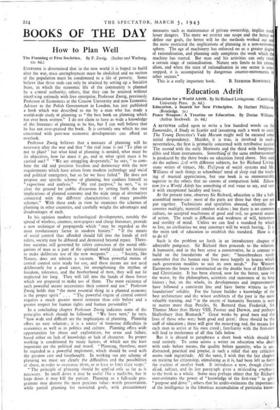Education Adrift
Education for a World Adrift. By Sir Richard Livingstone. (Cambridge University Press. 3s. 6d.)
Education, a Search for New Principles. By Herbert Philipson. (Routledge. 55.) Peace Weapon : A Treatise on Education. By Dorian Williams. (Arthur Stockwell. 2s. 6d.) A REVIEWER called upon to write a few hundred words on the Eumenides, A Study in Scarlet and (assuming such a work to exist) The Young Detective's Vade Mecum might well be excused some initial despondency. Murder, it is true, is involved in each: nevertheless,. the first is primarily concerned with retributive justice. The second with the early Mormons and the third with footprints, alibis and blunt instruments. Something of the same embarrassment is produced by the three books on education listed above. Not only • do the authors deal with different subjects, for Sir Richard Living- stone writes of virtues, Mr. Philipson of social systems and Mr. Williams of such things as schoolboys' need of sleep and the teach- ing of musical appreciation,' but one book is so immeasurably superior to the others that no canons of comparison hold. Educa- tion for a World Adrift has something of real value to say, and says it with exceptional lucidity and force.
At the present time, observes Sir Richard, education is like a half- assembled motor-car : most of the parts are there but they are not put together. Technicians and specialists abound, scientific dis- coveries multiply, material comfort widens ; but there is no common culture, no accepted touchstone of good and evil, no general source of action. The result is diffusion and weakness of will, bitterness and sterility of mind. Unless we can find a standard by which to live, no civilisation we may construct will be worth having. It is the main task of education to establish this standard. How is it to do it?
Such is the problem set forth in an introductory chapter of admirable pungency. Sir Richard then proceeds to the solution. A humanist, and in the best sense a- conservative, he is content to build on the foundations of the past: "housebreakers rarely remember that the human race lives most happily in houses which each generation modifies to suit its own needs." For Western Europeans the house is constructed on the double base of Hellenism and Christianity. It has been altered, now for the better, now for the worse, by the philosophers, scientists and statesmen of its long history ; but, on the whole, its developments and improvements have followed a consistent line and have borne witness to the foundations' solidity. For the future builder a knowledge of the best architecture and the wisest architects of the past is the most • valuable training, and " in the ascent of humanity 'Socrates is seen to matter more than - Pericles, St. Bernard than Frederick, Sir Thomas More than Henry VIII, Pasteur and Darwin, and perhaps Shaftesbury than Bismarck." Great works by good men and the lives of those who were both good and great: these should be the stuff of education ; these will give the measuring rod, the means for each man to arrive at his. own creed; familiarity with the first-rate will lead to intolerance of all that falls below.
But it is absurd to paraphrase a short book which should be read entirely. To come across a writer on education who deals with ends before means, the quality before quantity, who is tm- distracted, practical and precise, is such a relief that any criticism seems rank ingratitude. All the same, I wish that the last chapter on training for citizenship, stimulating as it is, had been left to form the nucleus of another book. It introduces a new, though closely allied, subject, and its last paragraph gives a misleading emphasis to the book as a whole. Some may perhaps object that Sir Richard over-estimates the power of " knowledge of the first-rate " to giw: " purpose and drive " ; others that he under-estimates the importance of the intelligence in the laborious accumulation of particular know- ledge generally necessary before principles can be put into practice. These are questions of stress: how they are answered in no way affects the argument nor its application. With Mr. Philipson we move, as it were, from Athens to Utah and Baker Street. A repetitive agglomeration of inaccurate history, undigested anthropology and philosophical floundering, his book is redeemed only by earnestness and anger. His thesis, stripped of excrescences, is that education is meaningless, since its effects are undone immediately by contact with the outer world, and only thoroughgoing social reforms can give it significance again. I wish he would write a personal account of his teaching experience: it would prove a far more compelling document than any amount of theorising. Meanwhile, his book should be read not as a judge- ment, but as part of the evidence. Mr. Williams, who is a preparatory schoolmaster, has written a very sensible little book which might well be read with profit by many of his fellows. Like Sir Richard Livingstone, he believes fervently in the value of the residential school, and would like to establish them in bunches, at Government expense, round each of the major public schools, which would give them its own distinctive pattern.
And perhaps, after all, something may be extracted from a com- parison of these three very different works. In the first place, by implication, if you are going to have any education at all, you had better have as much as possible. In the second, all three authors are prepared for the most audacious changes in the educational system. Finally, they bear joint witness that education is a deity who inspires in her votaries such faith as should move even the



























 Previous page
Previous page